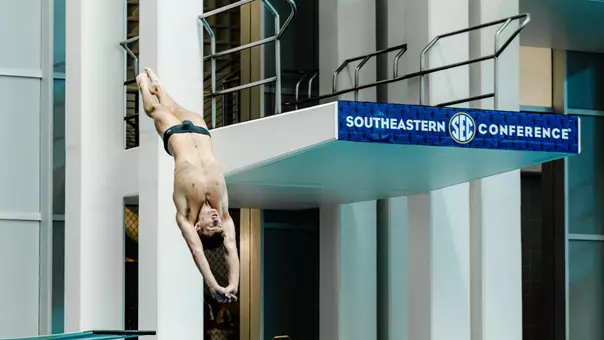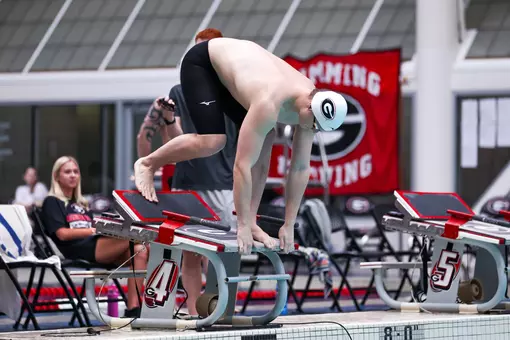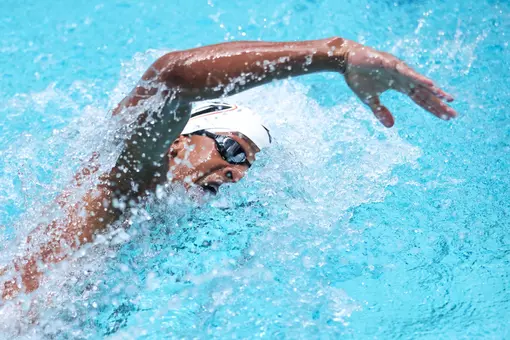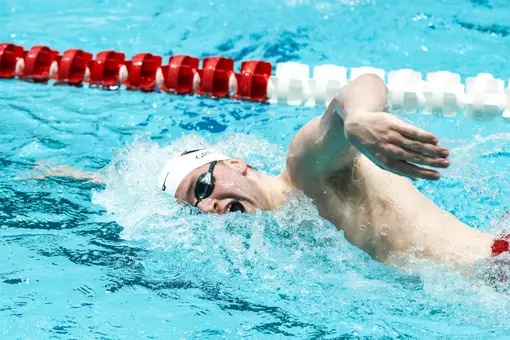University of Georgia Athletics

Grimes Made His Mark In Academics, Medicine
February 28, 2023 | The Frierson Files, Men's Swimming & Diving
By John Frierson
Staff Writer
Long before Dr. Randall Grimes was a successful medical professional with about as impressive an education and résumé as you'll ever see, he was a young, walk-on butterfly swimmer for the Georgia men's team.
Grimes, an Atlanta native, was the first Black man or woman to swim for Georgia. Grimes originally walked on as a freshman in 1980, "walked-off" that same year according to the 1981 media guide, and then competed for the Bulldogs his sophomore year.
Mark Nedza (1979-82), a senior captain on the 1982 team, grew up swimming with Grimes under coach Pete Higgins at the Atlanta Swim Association. The two also would room together on the road at Georgia.
"He was a butterflyer and so was I," Nedza said. "That's how I got to know him when he was a kid — I guess we were both kids. And then he showed up at the University of Georgia and came out for the team."
Grimes just swam for Georgia that one season, instead opting to focus on his academics, which were going to take him well beyond the lanes at the old Stegeman Hall pool, which once sat roughly where the Tate Center is now. And his brains, work-ethic and curiosity took him very, very far.
"He was just a really great guy. Certainly a great teammate and kind of a model citizen and hard worker," said Andy Satterfield, a captain on the 1980 and '81 teams.
Sadly, Grimes developed pulmonary hypertension in middle age and later died in 2010, at age 58, leaving behind his wife, Weselyn, twin daughters Jessica and Maya and youngest daughter Ivory. While Grimes departed the world far too young, he achieved way more than most while he was here.
After leaving swimming to focus on school, Grimes earned undergraduate degrees in both Molecular Biology and Physics. In 1983 and '84, he won the L.L. Hendron Undergraduate Physics Award.
Grimes then went to medical school at Emory, earning his medical degree in 1988. Later, he attended Georgia Tech and earned a Ph.D. in Mechanical Engineering, in 1996. And while working on his Ph.D., Grimes completed his internal medicine residency at the Morehouse School of Medicine, where his daughter Maya is now in med school after graduating from Harvard.
"He was kind of quiet — I'd say cerebral — and you knew he was kind of smart. But I didn't know he was that smart," Nedza said with a laugh.
In 1996, Grimes began a three-year cardiology fellowship at Massachusetts General Hospital, and later received a faculty appointment at Harvard. He eventually returned to the Atlanta area and became a partner at WellStar Cardiovascular Medicine.
"He had a good sense of humor, and he was kind and had a real calm demeanor about him.," Nedza said of his former teammate. "He didn't get frazzled, he was just Steady Eddie. He was the kind of surgeon or doctor you'd like to have."
Here is the short writeup in Grimes' bio in the 1981 Georgia swimming media guide, likely written by then-coach Pete Scholle (1971-82): "Randy Grimes — Sophomore, 5-7, 150, Atlanta, GA ... Butterfly ... good attitude ... was walk-on last year who walked-off for academic reasons, is back this year to stick ... has got to learn pace ... has great desire to excel in academics and in swimming and he will succeed ... Major: Pre-Med. Best times: 200-yard Butterfly — 2:06."
If you're wondering if any of Grimes' times are among the top 10 ever at Georgia, the answer is no. But nobody's times from those days hold up to the current swimmers' marks. Every single school record, and most of the top 10 times in program history, has been set within the past 10 years or so. The swimmers keep getting better, and the times keep getting lower. The oldest men's school record is in the 1,650 freestyle; during the 2012 NCAAs, Martin Grodzki set the program mark with a time of 14:24.08.
Former Georgia men's and women's head coach Jack Bauerle, who retired last summer, was just coaching the women's team when Grimes was a swimmer. Bauerle didn't know him well, "but he was extremely likable, I remember that."
After Grimes quit the team, Bauerle lost touch with him.
"We had no idea he became so accomplished. Good God!" Bauerle said.
The fact that Grimes was the first Black swimmer at Georgia wasn't a big deal at the time, Bauerle said.
"I don't remember anyone talking about the fact that we had a Black swimmer," he said.
"It was notable back then that there were very few African American swimmers (at the collegiate level), so we might have recognized that," Satterfield said. "But the fact that he was African American and we weren't, it was never an issue."
Harvey Humphries, Bauerle's longtime assistant and associate head coach, was a young assistant back in the early 1980s. When he thinks of Grimes, he said, he remembers a young man that "was the ultimate example of what you'd want in a swimmer, with a positive, can-do attitude."
While Grimes was the first Black swimmer to suit up for Georgia, the men's and women's programs did have some diversity within their rosters. International swimmers have long been commonplace in the sport, just as they have in collegiate tennis and golf, among others. Two spots below Grimes in the media guide (listed alphabetically) is Ignacio Ibarguen, a freshman from Spain.
Over the years, Georgia swimmers have competed in the Olympics for the U.S. and 19 other countries. One of those swimmers was the first Black woman to swim for Georgia, Maritza Correia McClendon, who arrived in the fall of 1999 and immediately helped the women win three straight NCAA team titles.
McClendon also earned 11 individual NCAA titles during her great UGA career, as well as being a 27-time All-American. In 2004, the freestyle standout made the U.S. Olympic swim team, the first Black woman to do so, and later earned a silver medal as part of the 400-meter freestyle relay team.
The freestyle was McClendon's event. And as she demonstrated multiple times over, the distance didn't much matter. She won SEC titles in the 50, 100, 200, 500 and 1,650.
"We'll never see that again," Bauerle said of McClendon's feat in a Black History Month feature on one of his greatest swimmers back in 2019.
McClendon made her mark in the pool, and to this day she works to help bring more diversity to the sport she loves. Grimes made his mark in medicine, as a doctor, professor and inventor. Both were Bulldogs, and both no doubt made the University of Georgia very proud.
Assistant Sports Communications Director John Frierson is the staff writer for the UGA Athletic Association and curator of the ITA Men's Tennis Hall of Fame. You can find his work at: Frierson Files. He's also on Twitter: @FriersonFiles and @ITAHallofFame.




